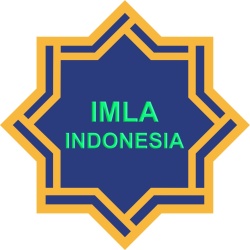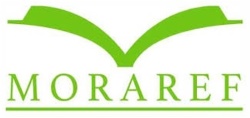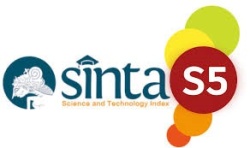Enhancing Arabic Language Learning in Class VIII MTsN 5 Jombang: An Evaluation Using the CIPP Model
 DOI:
DOI:
https://doi.org/10.32678/alittijah.v16i1.9051
 Abstract viewed : 479 times
|
Abstract viewed : 479 times
|  PDF downloaded : 386 times
PDF downloaded : 386 times
Keywords:
Arabic language education, CIPP evaluation model, curriculum evaluationAbstract
This qualitative study used CIPP model to assess Arabic language learning for Class VIII at MTsN 5 Jombang. Data collection was carried out by interviews, observation and documentation. The research respondents consisted of 3 Arabic teachers and 29 students of Class VIII-F, including 15 boys and 14 girls. Analysis of the findings including contextual, input, process and product dimensions. The results show that Arabic learning is enhanced by a supportive environment, good infrastructure, and cultural elements with rich Islamic cultural heritage. The program is supported by a balanced curriculum and well-equipped facilities. However, the curriculum must be updated following the latest national curriculum, Emancipated Curriculum, and teachers must be trained to remain relevant. Constant supervision is required to improve the quality of teaching and student engagement. The results of the evaluation showed that 80% of students met the minimum competency standards. However, more interactive teaching for speaking skills need improvement.
Downloads
References
Abourehab, Yousra, and Mahmoud Azaz. Pedagogical Translanguaging in Community/Heritage Arabic Language Learning. Journal of Multilingual and Multicultural Development 44, no. 5 (May 28, 2023): 398411. https://doi.org/10.1080/01434632.2020.1826496.
Adarkwah, Michael Agyemang. The Power of Assessment Feedback in Teaching and Learning: A Narrative Review and Synthesis of the Literature. SN Social Sciences 1, no. 3 (March 9, 2021): 75. https://doi.org/10.1007/s43545-021-00086-w.
Almaliki, Muhammad Fikri, Sovia Fahraini, and Maziyyatul Muslimah. Integrity of Arabic Language Education in The Sustainable Development Goals (SDGs). In Annual International Conference on Islamic and Science Integration (AICCII), 4150. Kediri: Institut Agama Islam Negeri (IAIN) Kediri, 2023.
Alokozay, Wahidullah, Sultan Zahid, and Noor Agha Noori. Lecturers and Students Attitudes towards English Language Department Curriculum of Languages and Literature Faculty Paktia-University by Using CIPP Model. Randwick International of Education and Linguistics Science Journal 4, no. 1 (March 31, 2023): 10313. https://doi.org/10.47175/rielsj.v4i1.613.
Al-Shanawani, Hania M. Evaluation of Self-Learning Curriculum for Kindergarten Using Stufflebeams CIPP Model. SAGE Open 9, no. 1 (January 8, 2019): 215824401882238. https://doi.org/10.1177/2158244018822380.
Andrei, Olivia. Enhancing Religious Education through Emotional and Spiritual Intelligence. HTS Teologiese Studies / Theological Studies 78, no. 1 (December 19, 2022). https://doi.org/10.4102/hts.v78i1.7887.
Assefa, Yalalem. Towards Learner-Oriented Monitoring and Evaluation in Adult Education Program: A Vital Approach to Ensure Adult Learners Learning Needs. Education Research International 2021 (April 22, 2021): 111. https://doi.org/10.1155/2021/6663700.
Aziz, Shamsa, Munazza Mahmood, and Zahra Rehman. Implementation of CIPP Model for Quality Evaluation at School Level: A Case Study. Journal of Education and Educational Development 5, no. 1 (May 30, 2018): 189. https://doi.org/10.22555/joeed.v5i1.1553.
Bassachs, Marcel, Dolors Caabate, Teresa Serra, and Jordi Colomer. Interdisciplinary Cooperative Educational Approaches to Foster Knowledge and Competences for Sustainable Development. Sustainability 12, no. 20 (October 18, 2020): 8624. https://doi.org/10.3390/su12208624.
Berbar, H., S. Lotfi, M. Essaoudi, and M. Talbi. A Psychometric Study: The Validation of a School Quality Assessment Tool. The Education and Science Journal 24, no. 4 (April 13, 2022): 11239. https://doi.org/10.17853/1994-5639-2022-4-112-139.
Bjelopoljak, ejla, and Arijana Midi. Pedagogical Discourse of Curriculum Development Based on the Orientation of Educational Practice. Metodiki Obzori 16, no. 1 (30) (November 8, 2021): 5776. https://doi.org/10.32728/mo.16.1.2021.03.
Casey, Ashley, and Mikael Quennerstedt. Cooperative Learning in Physical Education Encountering Deweys Educational Theory. European Physical Education Review 26, no. 4 (November 21, 2020): 102337. https://doi.org/10.1177/1356336X20904075.
Cayubit, Ryan Francis O. Why Learning Environment Matters? An Analysis on How the Learning Environment Influences the Academic Motivation, Learning Strategies and Engagement of College Students. Learning Environments Research 25, no. 2 (July 9, 2022): 58199. https://doi.org/10.1007/s10984-021-09382-x.
Childress, Cameron, James Dean Ward, Elizabeth Davidson Pisacreta, and Sunny Chen. Overseeing the Overseers: Can Federal Oversight of Accreditation Improve Student Outcomes?, May 25, 2022. https://doi.org/10.18665/sr.316765.
CHOIROCH, NIKMATIN. PENINGKATAN PRESTASI BELAJAR MELALUI MODEL PEMBELAJARAN SNOWBALL THROWING SISWA KELAS VII E SEMESTER GANJIL MTsN 5 JOMBANG. EDUCATIONAL : Jurnal Inovasi Pendidikan & Pengajaran 2, no. 4 (January 17, 2023): 37280. https://doi.org/10.51878/educational.v2i4.1830.
Daniati, Helda. School Administration With National Standards of Education to Improve the Quality of Education Indonesia. Indonesian Journal of Education (INJOE) 3, no. 2 (February 28, 2022): 17786. https://doi.org/10.54443/injoe.v3i2.23.
Didace, Nsengumuremyi, and Dr. Hesbon Opiyo Andala. The Relationship between Instructional Materials Usage in Teaching and Learning Outcome in History Subject within Secondary Schools in Rwanda. Journal of Education 4, no. 6 (October 13, 2021): 82101. https://doi.org/10.53819/81018102t5017.
Dinh, Thuong T.N., and Nga T. Nguyen. Factors Affecting the Quality of Assessment of Learning Outcomes from the Perspective of Primary Education Students. International Journal of Multidisciplinary Research and Analysis 05, no. 07 (July 14, 2022). https://doi.org/10.47191/ijmra/v5-i7-11.
Dizon, Arnie G. Historical Development of CIPP as a Curriculum Evaluation Model. History of Education 52, no. 1 (January 2, 2023): 10928. https://doi.org/10.1080/0046760X.2022.2098390.
Eldin, Ahmad Abdel Tawwab Sharaf. Teaching Culture in the Classroom to Arabic Language Students. International Education Studies 8, no. 2 (January 27, 2015). https://doi.org/10.5539/ies.v8n2p113.
ESTUNING, HARI. MENGELOLA INTERAKSI KELAS UNTUK MENINGKATKAN PEMAHAMAN MATERI PRESTASI DIRI MELALUI APLIKASI METODE DEMONSTRASI DAN EVALUASI PERSONAL DI KELAS IX F MTsN 5 JOMBANG. STRATEGY : Jurnal Inovasi Strategi Dan Model Pembelajaran 3, no. 1 (March 14, 2023): 8291. https://doi.org/10.51878/strategi.v3i1.2014.
Fahraini, Sovia, Muhammad Fikri Almaliki, and Maziyyatul Muslimah. Implementation of Sustainable Development Goals (SDGs) on Arabic Language Education Integrative Curriculum IAIN Kediri. In Annual International Conference on Islamic and Science Integration (AICCII) (Vol. 1, No. 1), 5160, 2023.
Fernndez-Garca, Carmen-Mara, Marcos Rodrguez-lvarez, and Mara-Paulina Viuela-Hernndez. University Students and Their Perception of Teaching Effectiveness. Effects on Students Engagement. Revista de Psicodidctica (English Ed.) 26, no. 1 (January 2021): 6269. https://doi.org/10.1016/j.psicoe.2020.11.006.
Fitria, Rika, and Maziyyatul Muslimah. Kemampuan Kreatif Siswa Dalam Implementasi Teori Belajar Kognitivisme. Ihtitam: Jurnal Pendidikan Bahasa Arab 6, no. 2 (December 1, 2023): 114.
Fitriyah, Immaa Iyyaanal, and Maziyyatul Muslimah. Relevansi Dan Implementasi Sikap Siswa Kelas Bahasa Arab Di Mts Al-Mahrusiyah Terhadap Karakteristik Sosial Setiap Individu. Al-Ittijah : Jurnal Keilmuan Dan Kependidikan Bahasa Arab 14, no. 2 (January 9, 2023): 91107. https://doi.org/10.32678/alittijah.v14i2.7303.
Glaubman, Rivka, and Hananyah Glaubman. A Proposal for Evaluation in Schools: Multifaceted Evaluation for the Facilitation of Learning and Instruction. The Educational Review, USA 5, no. 5 (May 27, 2021): 14654. https://doi.org/10.26855/er.2021.05.005.
Hanushek, Eric A. Addressing Cross-National Generalizability in Educational Impact Evaluation. International Journal of Educational Development 80 (January 2021): 102318. https://doi.org/10.1016/j.ijedudev.2020.102318.
Hayi, Abdul, and Mohamad Alwi. ANALISIS KEBIJAKAN PENDIDIKAN ISLAM INDONESIA DI ERA REFORMASI. Fitrah: Jurnal Studi Pendidikan 14, no. 1 (June 14, 2023): 8595. https://doi.org/10.47625/fitrah.v14i1.447.
Helda, Helda, and Syahrani Syahrani. National Standards of Education in Contents Standards and Education Process Standards in Indonesia. Indonesian Journal of Education (INJOE) 3, no. 2 (March 1, 2022): 25769. https://doi.org/10.54443/injoe.v3i2.32.
Indriana, Dina. Evaluasi Pembelajaran Dan Penilaian Autentik Dalam Pembelajaran Bahasa Arab. Al-Ittijah : Jurnal Keilmuan Dan Kependidikan Bahasa Arab 10, no. 2 (December 31, 2018): 34. https://doi.org/10.32678/al-ittijah.v10i02.1245.
JUNAIDAH, PIPIT DIAN. PENGUASAAN MUFRADAT MELALUI MEDIA LAGU UNTUK MENINGKATKAN KETERAMPILAN MENULIS BAHASA ARAB SISWA MTsN 5 JOMBANG. TEACHER : Jurnal Inovasi Karya Ilmiah Guru 2, no. 4 (February 10, 2023): 43745. https://doi.org/10.51878/teacher.v2i4.1919.
Jusar, Ira Rahmayuni, Ambiyar Ambiyar, and Ishak Aziz. EVALUATION PROGRAM APPROACH IN EDUCATION. JURNAL PAJAR (Pendidikan Dan Pengajaran) 7, no. 1 (January 30, 2023): 83. https://doi.org/10.33578/pjr.v7i1.9095.
Kadam, Pratik R., Umesh K. Gaikwad, and Preeti D. Bhamre. Student Centred Learning Using Students Learning Style. Journal of Engineering Education Transformations 34, no. 0 (January 31, 2021): 391. https://doi.org/10.16920/jeet/2021/v34i0/157185.
Kadir, Abdul, Siti Syamsudduha, and Muhammad Nur Akbar Rasyid. Evaluasi Program Tahfidz Dengan Model CIPP [Context, Input, Process, Product] Di Sekolah Dasar Integral Al-Bayan Makassar. ISLAMIKA 5, no. 4 (October 1, 2023): 142439. https://doi.org/10.36088/islamika.v5i4.3792.
Kalai, Insaf El, Brahim Kirmi, and Imad Ait Lhassan. Investigating the Effect of Teacher Commitment on Student Academic Achievement. International Journal of Research in Business and Social Science (2147- 4478) 10, no. 8 (January 1, 2022): 35063. https://doi.org/10.20525/ijrbs.v10i8.1507.
Kasmaini, Kasmaini, Syukri Hamzah, and Hadi Winarto. CIPP Evaluation Model: Online In-Service Teachers Training Program Conducted at English Language Education Study Program of Bengkulu University. ENGLISH FRANCA : Academic Journal of English Language and Education 7, no. 1 (May 23, 2023): 105. https://doi.org/10.29240/ef.v7i1.5871.
K.C., Rejina, and Parmeshor Baral. Applying Context, Input, Process and Product (CIPP) Model for Course Evaluation. KMC Journal 5, no. 1 (February 20, 2023): 20518. https://doi.org/10.3126/kmcj.v5i1.52460.
Kopas-Vukainovi, Emina M., and Vera M. Savi. Designing Curriculum Content As a Factor of Education Quality. 17, no. 1 (2020): 26171. https://doi.org/10.18485/uzdanica.2020.17.1.16.
Mahfuzi, Ahmad. Utilization of Environment-Based PAI Learning Resources. Journal of Social Science 4, no. 3 (May 25, 2023): 77784. https://doi.org/10.46799/jss.v4i3.574.
Marlina, Yuli, Teti Muliawati, and Mohamad Erihadiana. IMPLEMENTATION OF KURIKULUM MERDEKA IN INTEGRATED ISLAMIC SCHOOL. Tatar Pasundan: Jurnal Diklat Keagamaan 17, no. 1 (June 30, 2023): 6985. https://doi.org/10.38075/tp.v17i1.312.
MASHOOD WARRAH, SALEMAN, ALOBA FATIMAH MUSA, and ABDULRAHAMAN OLAREWAJU IBRAHIM. DETERMINE THE RELATIONSHIP BETWEEN TEACHER KNOWLEDGE AND STUDENTS ACADEMIC PERFORMANCE USING TEACHER COMMITMENT AS MEDIATOR. Quantum Journal of Social Sciences and Humanities 1, no. 5 (December 8, 2020): 112. https://doi.org/10.55197/qjssh.v1i5.25.
Mendo-Lzaro, Santiago, Benito Len-del-Barco, Mara-Isabel Polo-del-Ro, and Vctor M. Lpez-Ramos. The Impact of Cooperative Learning on University Students Academic Goals. Frontiers in Psychology 12 (January 5, 2022). https://doi.org/10.3389/fpsyg.2021.787210.
Meng, Shengrong. Enhancing Teaching and Learning: Aligning Instructional Practices with Education Quality Standards. Research and Advances in Education 2, no. 7 (July 2023): 1731. https://doi.org/10.56397/RAE.2023.07.04.
Miller-Young, Janice, and Cheryl N. Poth. Complexifying Our Approach to Evaluating Educational Development Outcomes: Bridging Theoretical Innovations with Frontline Practice. International Journal for Academic Development 27, no. 4 (October 2, 2022): 38699. https://doi.org/10.1080/1360144X.2021.1887876.
Muslimah, Maziyyatul. Developing Arabic Educational Games in Arabiyah Lil Athfal Entrepreneurship Course Using Project-Based Learning. Maharaat: Jurnal Pendidikan Bahasa Arab 5, no. 1 (November 18, 2022): 1637. https://doi.org/10.18196/mht.v5i1.15838.
Muslimah, Maziyyatul, and Siti Zumrotun Nisaul Mutiatul Karimah. Asesmen Kinerja Dalam Pembelajaran Kalam Bahasa Arab Siswa MTs Tahun 2023: Penelitian Pustaka Melalui Google Scholar. ADRIS AL-ARABIYAT: Jurnal Kajian Ilmu Pendidikan Bahasa Arab 4, no. 1 (January 24, 2024): 120.
Muslimah, Maziyyatul, and Latifah Latifah. Lingkungan Pendidikan Pesantren Dalam Pembentukan Karakter Di Madrasah Tsanawiyah Al-Mahrusiyah Lirboyo Kota Kediri. Risalatuna: Journal of Pesantren Studies 2, no. 2 (July 15, 2022): 16980. https://doi.org/10.54471/rjps.v2i2.1817.
Muslimah, Maziyyatul, and Amila Widiyanti. Analisis Daya Beda Tes Hasil Belajar Bahasa Arab Siswa SMA Mambaul Hikmah Paron Ngawi. AL-MUARRIB: JOURNAL OF ARABIC EDUCATION 3, no. 2 (September 12, 2023): 1323. https://doi.org/10.32923/al-muarrib.v3i2.3594.
Muzaqi, Ajie Hanif, and Berlian Tyasotyaningarum. Village Community Empowerment Model in Smart Village Perspective (Study on Village Communities in Jombang Regency). JKMP (Jurnal Kebijakan Dan Manajemen Publik) 10, no. 1 (April 28, 2022): 4253. https://doi.org/10.21070/jkmp.v10i1.1683.
Namalefe, Susan Allen. The Impact of Education in South Asia. Journal of International Students 10, no. 3 (August 15, 2020): 78789. https://doi.org/10.32674/jis.v11i2.2532.
Necula, Constantin V. The Role of Spiritual Formation in the Education of Modern Human Beings: A European Christian Perspective. HTS Teologiese Studies / Theological Studies 77, no. 4 (September 30, 2021). https://doi.org/10.4102/hts.v77i4.6778.
Pakpahan, Hetty M, Suherni Suherni, Lilis Pujiati, and Rostiodertina Girsang. Effectiveness of Indonesian Education Curriculum Reform on the Quality of Processes in Learning. Jurnal Penelitian Pendidikan IPA 9, no. 1 (January 31, 2023): 56469. https://doi.org/10.29303/jppipa.v9i1.3930.
Piper, Kevin. Feature: The Time to Write: Teaching Second-Semester Composition through Reflection on Informal Evaluations. Teaching English in the Two-Year College 49, no. 2 (December 1, 2021): 12442. https://doi.org/10.58680/tetyc202131661.
Podungge, Robiyati, Mintarti Rahayu, Margono Setiawan, and Achmad Sudiro. Teacher Competence and Student Academic Achievement. In Proceedings of the 23rd Asian Forum of Business Education(AFBE 2019). Paris, France: Atlantis Press, 2020. https://doi.org/10.2991/aebmr.k.200606.011.
Pradana, Dian Arief, Mahfud Mahfud, Candra Hermawan, and Herdiana Dyah Susanti. Nasionalism: Character Education Orientation in Learning Development. Budapest International Research and Critics Institute (BIRCI-Journal): Humanities and Social Sciences 3, no. 4 (January 22, 2021): 402634. https://doi.org/10.33258/birci.v3i4.1501.
Rahman, Abdul, Wahyu Naldi, Adiyatna Arifin, and Fazlur Mujahid R. Analisis UU Sistem Pendidikan Nasional Nomor 20 Tahun 2003 Dan Implikasinya Terhadap Pelaksanaan Pendidikan Di Indonesia. Journal of Education and Instruction (JOEAI) 4, no. 1 (June 4, 2021): 98107. https://doi.org/10.31539/joeai.v4i1.2010.
Rakhmonalievna, Isaeva Mukhabbat. Education As A Factor Of Development. The American Journal of Social Science and Education Innovations 2, no. 09 (September 30, 2020): 59195. https://doi.org/10.37547/tajssei/Volume02Issue09-89.
Rifai, Ahmad, and Maziyyatul Muslimah. Unlocking Potential: Rethinking MBKM Curriculum Reformation with Constrained Resources in Arabic Education Study Program. Arabiyatuna: Jurnal Bahasa Arab 8, no. 1 (May 27, 2024): 2554.
Rosyiah, Siti Aviatur, Saudah Saudah, and Rodhatul Jennah Jennah. THE EVALUATION OF CIPP MODEL IN LEARNING CENTERS IN ISLAMIC KINDERGARTEN DARUSSALAM PALANGKARAYA. Al-Hikmah : Indonesian Journal of Early Childhood Islamic Education 6, no. 1 (June 13, 2022): 8392. https://doi.org/10.35896/ijecie.v6i1.248.
Rukiyati, Rukiyati. Tujuan Pendidikan Nasional Dalam Perspektif Pancasila. HUMANIKA 19, no. 1 (February 12, 2020): 5669. https://doi.org/10.21831/hum.v19i1.30160.
Sakti, Umi. Arabic Language Learning Evaluation in Higher Education with Context Input Process Product (CIPP) Model. ALSINATUNA 4, no. 1 (December 21, 2018): 33. https://doi.org/10.28918/alsinatuna.v4i1.1591.
Sapira, Sapira, Haratua Tiur Maria Silitonga, and Syukran Mursyid. EVALUASI PROGRAM REMEDIAL MENGGUNAKAN MODEL CONTEXT, INPUT, PROCESS, PRODUCT PADA PEMBELAJARAN FISIKA. Jurnal Inovasi Penelitian Dan Pembelajaran Fisika 2, no. 2 (September 25, 2021): 44. https://doi.org/10.26418/jippf.v2i2.42403.
Shinde, Shilpa. IMPORTANCE OF EVALUATION IN TEACHING LEARNING PROCESS. SCHOLARLY RESEARCH JOURNAL FOR HUMANITY SCIENCE AND ENGLISH LANGUAGE 10, no. 54 (December 1, 2022). https://doi.org/10.21922/srjhsel.v10i54.11783.
Simionescu, Anca, and Cristian Stan. The Dynamic Approach of Education: Focus on Educational Actions and Subsequent Evaluations. Educatia 21, no. 25 (November 30, 2023): 9298. https://doi.org/10.24193/ed21.2023.25.10.
Sopha, Satja, and Alexander Nanni. The CIPP Model : Applications in Language Program Evaluation. The Journal of AsiaTEFL 16, no. 4 (December 31, 2019): 136067. https://doi.org/10.18823/asiatefl.2019.16.4.19.1360.
Stufflebeam, Daniel L. The CIPP Model for Program Evaluation. In Evaluation Models, 11741. Dordrecht: Springer Netherlands, 1983. https://doi.org/10.1007/978-94-009-6669-7_7.
Suwartini, Sri, and Sutama Sutama. INPUT-PROCESS-OUTPUT-OUTCOME QUALITY IN MANAGING EDUCATION IN ELEMENTARY SCHOOLS. Primary: Jurnal Pendidikan Guru Sekolah Dasar 12, no. 2 (April 27, 2023): 510. https://doi.org/10.33578/jpfkip.v12i2.9620.
Szczepek Reed, Beatrice, Geraldine Bengsch, Fatma F. S. Said, Jayme Scally, and Ian Davies. Arabic Language Heritage Schools, 14873, 2020. https://doi.org/10.4018/978-1-7998-1978-3.ch008.
Szkl, Istvn, Katarna Szarka, and Jn Harga. The Functions of Educational Evaluation. R&E-SOURCE, July 29, 2022. https://doi.org/10.53349/resource.2022.iS24.a1112.
. The Functions of Educational Evaluation. R&E-SOURCE, July 29, 2022. https://doi.org/10.53349/resource.2022.iS24.a1112.
Tabassum, Rabia, Aimen Saleem, and Dr Mahvish Fatima. Academic Efficacy as Correlate of Students Performance: A Study on Adolescents of Lahore. Journal of Social Sciences Review 3, no. 2 (April 8, 2023): 6069. https://doi.org/10.54183/jssr.v3i2.206.
Tetzlaff, Leonard, Florian Schmiedek, and Garvin Brod. Developing Personalized Education: A Dynamic Framework. Educational Psychology Review 33, no. 3 (September 29, 2021): 86382. https://doi.org/10.1007/s10648-020-09570-w.
Ting, Ding Hooi. Understanding Knowledge Transfer and Knowledge Management through Social Learning. Journal of Knowledge Management 27, no. 7 (July 24, 2023): 190424. https://doi.org/10.1108/JKM-04-2022-0246.
Ukhrowiyah, Ukhrowiyah, Muhammad Busronul Arif, and Maziyyatul Muslimah. The Relevance of Arabic Language Education Towards Quality Education. In Annual International Conference on Islamic and Science Integration (AICCII), 111. Kediri: Institut Agama Islam Negeri (IAIN) Kediri, 2023.
Umam, Khalif Ashhabul, and Iip Saripah. Using the Context, Input, Process and Product (CIPP) Model in the Evaluation of Training Programs. International Journal of Pedagogy and Teacher Education 2 (December 17, 2018): 19. https://doi.org/10.20961/ijpte.v2i0.26086.
Umam, Khoirul. Dinamika Pengembangan Kurikulum Pendidikan Agama Islam Di Madrasah (Studi Multi-Situs Di Kabupaten Jombang). Jurnal Pendidikan Agama Islam (Journal of Islamic Education Studies) 6, no. 1 (May 29, 2018): 124. https://doi.org/10.15642/jpai.2018.6.1.1-24.
Unsi, Baiq Tuhfatul. Pembelajaran Bahasa Arab Melalui Pendekatan Komunikatif; Studi Kasus Di Pondok Pesantren al-Munawaroh Ngemplak Ngudirejo Diwek Jombang. Tafqquh: Jurnal Penelitian Dan Kajian Keislaman 4, no. 1 (June 1, 2016): 5777. https://doi.org/10.52431/tafaqquh.v4i1.55.
Wafiroh, Hibatin, and Maziyyatul Muslimah. Psikososial Remaja Dalam Pembelajaran Bahasa Arab Di Madrasah Tsanawiyah Berbasis Pesantren. Tadris : Jurnal Penelitian Dan Pemikiran Pendidikan Islam 17, no. 2 (December 28, 2023): 1224.
Wakhidah, Anik, and Adi Bandono. Strategies for Improving the Quality of Learning Outcomes in Elementary Schools. KnE Social Sciences, June 20, 2022, 37785. https://doi.org/10.18502/kss.v7i10.11240.
Warju, Warju. Educational Program Evaluation Using CIPP Model. Innovation of Vocational Technology Education 12, no. 1 (December 21, 2016). https://doi.org/10.17509/invotec.v12i1.4502.
Zhao, Fuming. Research on Educational Evaluation, Promote the Development of Teachers and Students. Science Insights Education Frontiers 10, no. S1 (September 13, 2021): 9. https://doi.org/10.15354/sief.21.s1.ab039.
Downloads
Published
Issue
Section
License
Copyright (c) 2024 Maziyyatul Muslimah, Aini Alfatihah, Nur Izzati Fitriah, Siti Maftuhah

This work is licensed under a Creative Commons Attribution-ShareAlike 4.0 International License.















